Skincare Rituals For Your 60s and 70s As we age, our skin goes through many changes. Wrinkles deepen, age spots become more prominent, and our skin becomes thinner and less elastic. It is essential to develop skincare rituals specifically tailored for our 60s and 70s to maintain healthy and radiant skin throughout the aging process.
In this article, we will explore the best skincare practices and products for aging skin. Whether you are concerned about dryness, mature skin, or simply want to establish a skincare routine that addresses the unique needs of your skin, we have you covered. From moisturizers infused with hyaluronic acid to nourishing cleansers and targeted serums, we will guide you towards a skincare regimen that revitalizes and rejuvenates.
Key Takeaways: Skincare Rituals For Your 60s and 70s
- Skincare rituals in your 60s and 70s are crucial for maintaining healthy and radiant skin.
- Aging skin requires specialized products that target common concerns such as wrinkles and dryness.
- Moisturizers with hyaluronic acid can help replenish and hydrate the skin, reducing the appearance of fine lines.
- Develop a morning and evening skincare routine that includes cleansers, serums, moisturizers, and SPF.
- Avoid harsh ingredients and include products formulated for mature skin in your skincare regimen.
Best Cosmetic Treatments for Women in Their 60s
In your 60s, cosmetic treatments can help address the visible signs of aging. It’s common for women in this age group to experience wrinkles, sagging skin, and age spots. Luckily, there are various cosmetic procedures available that can help rejuvenate and refresh your appearance.
Dermal Fillers and Injectables
One popular option for women in their 60s is dermal fillers and injectables. These treatments, such as Juvéderm and Botox, can reduce wrinkles and restore lost volume in the face. Dermal fillers are used to plump up areas that have lost volume due to the natural aging process, while injectables, like Botox, help relax the muscles that contribute to wrinkles.
Ultherapy
If you’re looking for a non-invasive treatment to lift and tighten your skin, Ultherapy is an excellent choice. This procedure uses ultrasound technology to stimulate collagen production, resulting in firmer and more youthful-looking skin. Ultherapy can target areas such as the lower face, neck, brow, and décolletage.
Laser Treatments
Laser treatments are another effective option for women in their 60s. Procedures like Excel V+ and Laser Genesis can improve skin texture, minimize the appearance of age spots, and promote collagen production. These treatments are non-invasive and provide noticeable results with minimal downtime.
Microneedling
Microneedling is a minimally invasive procedure that stimulates collagen production and reduces the appearance of wrinkles and fine lines. During the treatment, tiny needles create micro-injuries in the skin, triggering the body’s natural healing response. This leads to the production of new collagen, resulting in smoother and more youthful-looking skin.
Ultimately, the best cosmetic treatment for you will depend on your specific concerns and goals. Consult with a cosmetic dermatologist or plastic surgeon to determine which procedures are most suitable for your skin type and desired outcomes.
| Cosmetic Treatment | Benefits |
|---|---|
| Dermal Fillers and Injectables | Reduces wrinkles and restores lost volume |
| Ultherapy | Lifts and tightens skin without surgery |
| Laser Treatments | Improves skin texture and reduces age spots |
| Microneedling | Stimulates collagen production and reduces wrinkles |
By exploring these cosmetic treatments and discussing them with a qualified professional, you can find the best solution to address your specific needs and achieve a more youthful appearance in your 60s.
Morning Skincare Routine After 60
Having a consistent morning skincare routine is essential for maintaining healthy and radiant skin in your 60s. Follow these steps to start your day off with a refreshing and nourishing skincare regimen.
Cleanser
Begin by cleansing your face with a gentle cleanser that suits your skin type. Look for a cleanser that effectively removes dirt and impurities without stripping the skin of its natural oils. Massage the cleanser onto damp skin in gentle circular motions, then rinse thoroughly with lukewarm water.
Serum
After cleansing, apply a hydrating serum to deliver active ingredients deep into the skin. Choose a serum that addresses your specific skin concerns, such as fine lines, wrinkles, or uneven skin tone. Gently pat the serum onto your face and neck, allowing it to fully absorb before moving to the next step.
Moisturizer
Next, apply a nourishing moisturizer to hydrate and protect your skin throughout the day. Opt for a moisturizer with ingredients like hyaluronic acid and antioxidants to boost hydration and combat signs of aging. Massage the moisturizer onto your face and neck using upward strokes, focusing on areas prone to dryness.
SPF
Don’t forget to apply sunscreen with a broad-spectrum SPF of 30 or higher to shield your skin from harmful UV rays. The sun’s rays can accelerate skin aging and contribute to the development of wrinkles, age spots, and other signs of sun damage. Generously apply sunscreen to all exposed areas, including your face, neck, and hands.
| Step | Skincare Product |
|---|---|
| 1 | Cleanser |
| 2 | Serum |
| 3 | Moisturizer |
| 4 | SPF |
Having a morning skincare routine that includes cleansing, serum application, moisturizing, and sun protection is key to maintaining healthy and youthful-looking skin. Remember to choose products that are specifically formulated for mature skin and address your individual concerns. By following this simple routine, you can start your day with confidence, knowing that your skin is well taken care of.
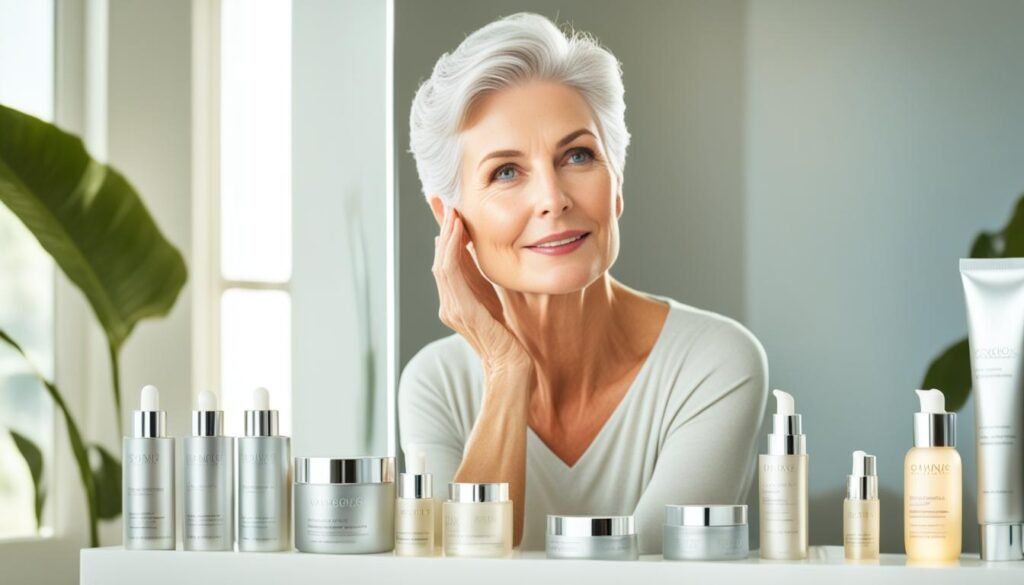
Evening Skincare Routine After 60
A nighttime skincare routine is crucial for repairing and nourishing the skin overnight. By following a consistent and effective evening skincare routine, you can help reduce the visible signs of aging and wake up with refreshed and rejuvenated skin.
Cleanse and Double Cleanse
The first step in your evening skincare routine is to cleanse your skin thoroughly. Start by removing any makeup with a gentle makeup remover or cleansing oil, then follow up with a hydrating cleanser formulated for your specific skin type. Double cleansing ensures that all impurities and debris are removed, allowing your skin to better absorb the following skincare products.
Tone and Balance
After cleansing, use a toner to balance the pH of your skin and prepare it for the next steps. Look for a toner that is alcohol-free and contains hydrating and soothing ingredients, such as hyaluronic acid or chamomile extract. Applying toner can also help remove any remaining traces of makeup or cleanser.
Retinol Treatment
Retinol is a powerful anti-aging ingredient that can help minimize the appearance of wrinkles, fine lines, and uneven skin tone. Apply a retinol serum or cream to clean, dry skin in the evening. Start with a low concentration and gradually increase as tolerated. Remember to follow up with a moisturizer to minimize any potential dryness or irritation.
Nourish with Night Cream
Night creams are specifically formulated to provide intense hydration and nourishment to the skin while you sleep. Look for a night cream that contains antioxidants, peptides, and hyaluronic acid to help restore moisture and improve skin elasticity. Gently massage the cream onto your face and neck in upward motions to promote circulation and absorption.
Pamper Your Lips
Don’t forget to give some extra care to your lips. Apply a nourishing lip balm before bed to keep your lips moisturized and prevent dryness and cracking. Look for lip balms that contain ingredients like shea butter, beeswax, or coconut oil for maximum hydration.
By incorporating these steps into your evening skincare routine, you can support your skin’s natural repair processes and wake up with a more radiant and youthful complexion.
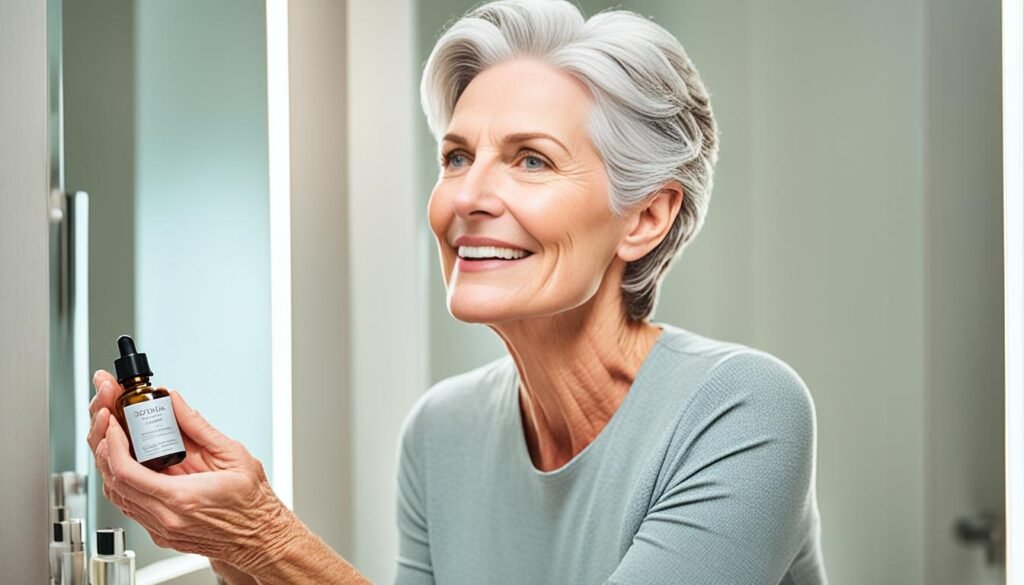
What to Avoid in Your Skincare Routine After 60
While it’s important to choose the right skincare products and establish a proper skincare routine for mature skin, it’s equally crucial to avoid certain ingredients and practices that can be detrimental to your skin’s health and appearance. Here are some things to steer clear of in your skincare routine:
1. Alcohol-Based Toners
Alcohol-based toners may strip away your skin’s natural oils and disrupt its moisture balance. Instead, opt for gentle and hydrating toners that help to nourish and replenish your skin.
2. Strong Retinoids
Strong retinoids can be too harsh for older skin and may cause irritation and dryness. Look for milder retinol formulations that are better suited for mature skin.
3. Harsh Scrubs
Harsh scrubs can damage your skin’s delicate barrier and exacerbate signs of aging. Consider using gentle exfoliants that use ingredients like enzymes or chemical exfoliants to achieve a smoother complexion without causing irritation.
4. Scented Products
Scented products often contain fragrances that can be irritating to the skin, especially for those with sensitive skin. Opt for fragrance-free alternatives to minimize the risk of inflammation and allergic reactions.
5. Hot Water
Hot water can strip the skin of its natural oils and contribute to dehydration. Stick to lukewarm water when cleansing your face and avoid excessive hot water exposure to maintain your skin’s moisture levels.
By avoiding these skincare pitfalls, you can better protect your skin’s health and ensure that your skincare routine is optimized for mature skin. Remember, consult with a dermatologist or skincare professional for personalized advice tailored to your specific needs.
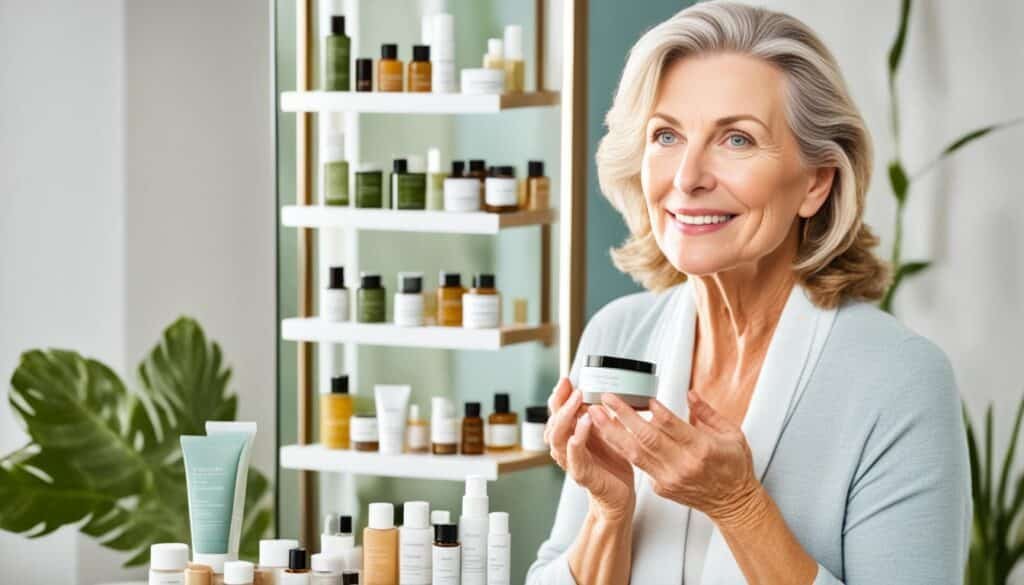
| Ingredient/Practice | Reason to Avoid |
|---|---|
| Alcohol-Based Toners | May strip away natural oils and disrupt moisture balance |
| Strong Retinoids | Can cause irritation and dryness |
| Harsh Scrubs | Can damage the skin’s barrier and exacerbate signs of aging |
| Scented Products | May contain fragrances that can irritate the skin |
| Hot Water | Strips the skin of natural oils and contributes to dehydration |
Best Skincare Products for Women in Their 60s
Choosing the right skincare products is essential for maintaining healthy and youthful skin. When it comes to skincare in your 60s, look for products specifically formulated for mature skin to address common concerns such as wrinkles, dryness, and loss of elasticity. Incorporating these products into your skincare routine can help revitalize and nourish your skin for a more radiant appearance.
Anti-Aging Moisturizers
Anti-aging moisturizers are a must-have for women in their 60s. These moisturizers are formulated with ingredients that promote skin firmness, reduce the appearance of wrinkles, and provide intense hydration. Look for moisturizers that contain ingredients like hyaluronic acid and peptides to plump and hydrate the skin. Brands like Olay, CeraVe, and Neutrogena offer excellent options for mature skin.
Serums with Hydrating Ingredients
Serums are concentrated formulations that deliver a potent dose of active ingredients to target specific skincare concerns. For women in their 60s, serums with hydrating ingredients like hyaluronic acid can help replenish moisture and improve the skin’s elasticity. The Ordinary, Drunk Elephant, and Skinceuticals offer a range of serums that address different skin concerns.
Eye Cream
The delicate skin around the eyes is prone to signs of aging, including fine lines and crow’s feet. Using an eye cream specially formulated for mature skin can help reduce the appearance of wrinkles, puffiness, and dark circles. Look for eye creams that contain ingredients like retinol, peptides, and antioxidants. Brands like RoC, Estée Lauder, and Origins offer effective eye creams for mature skin.
Lip Balm
As we age, our lips can become dry and lose volume. Using a moisturizing lip balm can help keep your lips hydrated and prevent them from becoming chapped. Look for lip balms that contain ingredients like shea butter, coconut oil, and vitamin E to nourish and restore moisture to your lips. Brands like Burt’s Bees, Aquaphor, and Nivea offer a range of lip balms that provide long-lasting hydration.
| Product Type | Recommended Brands |
|---|---|
| Anti-Aging Moisturizers | Olay, CeraVe, Neutrogena |
| Serums with Hydrating Ingredients | The Ordinary, Drunk Elephant, Skinceuticals |
| Eye Cream | RoC, Estée Lauder, Origins |
| Lip Balm | Burt’s Bees, Aquaphor, Nivea |
Choosing the best skincare products for women in their 60s can make a significant difference in the health and appearance of your skin. By incorporating anti-aging moisturizers, hydrating serums, eye creams, and lip balms into your skincare routine, you can nourish and rejuvenate your skin for a more youthful and radiant complexion.
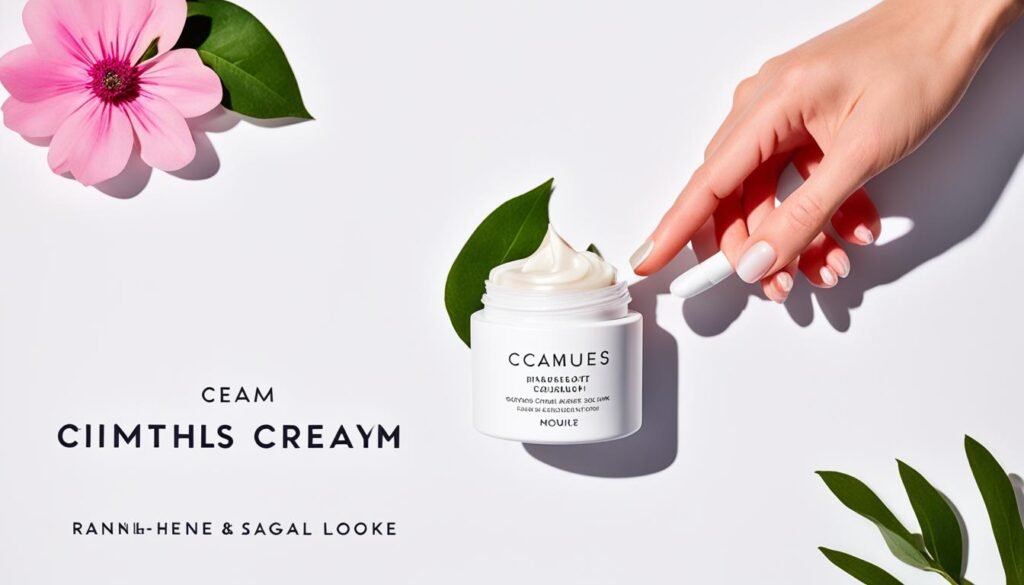
Expert Tips for Healthy Skin in Your 60s and 70s
While following a skincare routine is crucial for maintaining healthy skin, there are also additional tips to keep your skin looking youthful and radiant in your 60s and 70s.
- Sun Protection: Protecting your skin from the sun is essential at any age. Use a broad-spectrum sunscreen with SPF 30 or higher daily, even on cloudy days. Wear protective clothing, such as wide-brimmed hats and long-sleeved shirts, and seek shade during the peak hours of sun exposure.
- Regular Check-ups: Schedule regular check-ups with a dermatologist to monitor any changes in your skin, such as new moles or growths. They can provide early detection and treatment for skin conditions.
- Avoid Excessive Exfoliation: While exfoliating can help remove dead skin cells, too much can irritate and damage your skin. Avoid harsh scrubs and opt for gentle exfoliants, such as chemical exfoliators with AHAs or BHAs.
Expert Tip: “Sun protection is key to maintaining healthy skin in your 60s and 70s. Make sure to apply sunscreen every day and wear protective clothing to shield your skin from harmful UV rays.” – Dr. Emily Johnson, Dermatologist
In addition to these tips, maintaining a healthy lifestyle can also contribute to the overall health of your skin. Stay hydrated, eat a balanced diet rich in fruits and vegetables, get regular exercise, and avoid smoking.
By incorporating these expert tips into your skincare routine and lifestyle, you can ensure that your skin remains healthy and glowing as you age.
Clarins’ Guide to Skincare in Your 60s and Beyond
As we enter our 60s and beyond, our skin goes through significant changes, requiring specific care and attention. Clarins recommends a hydrating moisturizer formulated for mature skin to address common concerns such as dryness, wrinkles, fine lines, and loss of firmness. With lower estrogen levels, the skin can become dry and fragile, leading to increased sensitivity and a lack of moisture. Choosing the right products can help revitalize the skin and restore radiance.
One of the key issues faced by individuals with mature skin is dryness. As we age, our skin produces less oil, leading to an increased likelihood of dry and dehydrated skin. Hydrating moisturizers, rich in nourishing ingredients and essential oils, can help combat dryness, providing intense hydration and replenishing the skin’s moisture barrier.
Wrinkles and fine lines are also common signs of aging skin. To address these concerns, it is important to incorporate products infused with anti-aging ingredients such as peptides, retinol, and antioxidants. These ingredients can help improve skin elasticity, smooth out fine lines, and reduce the appearance of wrinkles.
| Common Concerns | Recommended Products |
|---|---|
| Dryness | Hydrating moisturizers with essential oils |
| Wrinkles and Fine Lines | Anti-aging products with peptides and retinol |
| Loss of Firmness | Lifting and firming creams with collagen-boosting ingredients |
Firmness is another area of concern for individuals in their 60s and beyond. With age, the skin loses its elasticity and begins to sag. Lifting and firming creams formulated with collagen-boosting ingredients, such as peptides and plant extracts, can help restore firmness and redefine facial contours.
By incorporating a hydrating moisturizer, targeting dryness, wrinkles, and fine lines, and utilizing lifting and firming products, you can help nourish and restore your skin’s vitality. Remember to always cleanse your skin gently, exfoliate regularly, and protect it from harmful UV rays by applying a broad-spectrum sunscreen every day.
Expert Tip: Hyaluronic Acid for Mature Skin
In addition to the recommended products, consider adding hyaluronic acid to your skincare routine. Hyaluronic acid is a powerful humectant that attracts and retains moisture, helping to plump and hydrate the skin. Incorporating hyaluronic acid-infused serums or moisturizers can further enhance your skincare routine and provide additional hydration for mature skin.
Discover the Best Skin Care Routine for Every Skin Type
Different skin types require different skincare routines. Whether you have normal, acne-prone, oily, sensitive, dry, or combination skin, there is a skincare routine tailored to your needs. Consult with a dermatologist to determine the best skincare regimen for your specific skin type.
Normal Skin
Normal skin is well-balanced and does not experience excessive dryness or oiliness. To maintain healthy skin, follow this skincare routine:
- Cleanse your face twice daily with a gentle cleanser.
- Apply a hydrating serum to lock in moisture.
- Moisturize with a lightweight lotion or cream.
- Protect your skin from the sun with a broad-spectrum SPF.
Acne-Prone Skin
Acne-prone skin is prone to breakouts and blemishes. Manage acne and promote clear skin with this skincare routine:
- Use a gentle cleanser to cleanse your face twice daily.
- Apply a salicylic acid or benzoyl peroxide treatment to target acne.
- Moisturize with an oil-free moisturizer to hydrate without clogging pores.
- Protect your skin from the sun with a non-comedogenic SPF.
Oily Skin
Oily skin produces excess sebum, leading to a shiny appearance and enlarged pores. Control oil and maintain a matte complexion with this skincare routine:
- Use a gel or foaming cleanser to cleanse your face twice daily.
- Apply a toner with ingredients like witch hazel or salicylic acid to control oil.
- Moisturize with an oil-free or mattifying moisturizer.
- Protect your skin from the sun with a lightweight, oil-free SPF.
Sensitive Skin
Sensitive skin is prone to redness, irritation, and reactions to certain products. Soothe and protect your skin with this skincare routine:
- Cleanse your face twice daily with a gentle, fragrance-free cleanser.
- Apply a soothing serum with ingredients like aloe vera or green tea extract.
- Moisturize with a gentle, hypoallergenic moisturizer.
- Protect your skin from the sun with a mineral-based, fragrance-free SPF.
Dry Skin
Dry skin lacks moisture and can feel tight and flaky. Hydrate and nourish your skin with this skincare routine:
- Cleanse your face twice daily with a gentle, creamy cleanser.
- Apply a hydrating serum with ingredients like hyaluronic acid or glycerin.
- Moisturize with a rich, emollient cream or face oil.
- Protect your skin from the sun with a moisturizer that contains SPF.
Combination Skin
Combination skin has both oily and dry areas, requiring a balanced skincare routine. Achieve harmony with this skincare routine:
- Use a gentle cleanser to cleanse your face twice daily.
- Apply a lightweight, oil-free moisturizer or gel to hydrate.
- Use a mattifying primer on oily areas to control shine.
- Protect your skin from the sun with a broad-spectrum SPF.
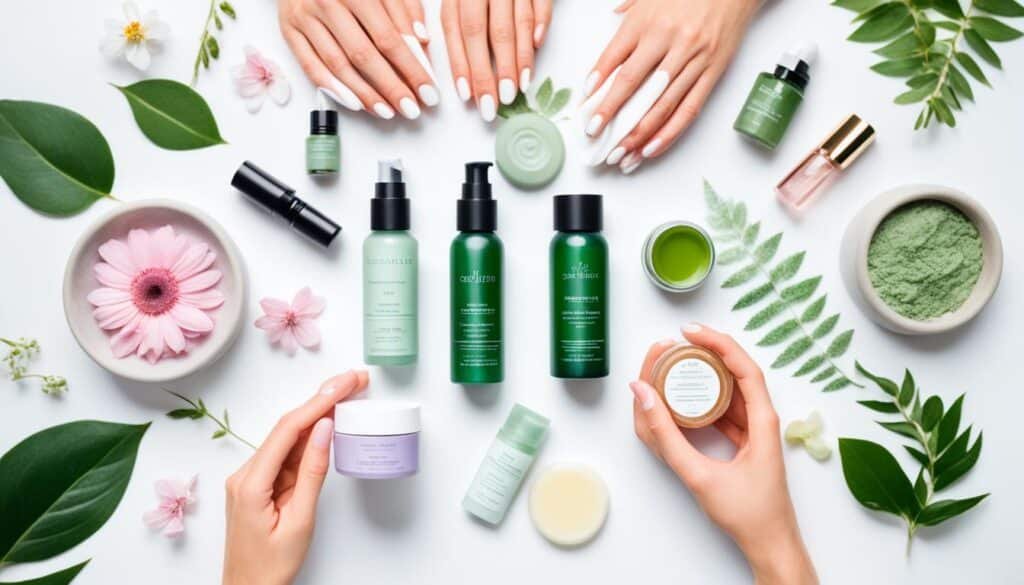
Dermatologist-Recommended Skin Care
When it comes to caring for your skin, dermatologists recommend specific products that target various skin concerns. Whether you’re looking to establish a new skincare regimen or upgrade your existing one, incorporating dermatologist-recommended products can make a significant difference. These products are specially formulated to address common skincare issues and promote overall skin health.
Gentle Cleanser
To start your skincare routine, a gentle cleanser is essential. Look for a cleanser that effectively removes dirt and impurities without stripping the skin of its natural oils. Dermatologists often recommend cleansers that are non-irritating and suitable for all skin types, including cleansers with mild ingredients like glycerin and ceramides.
Hydrating Serum
A hydrating serum is a must-have for any skincare regimen. Serums are concentrated formulas that deliver potent ingredients deep into the skin. Look for serums that contain hyaluronic acid, which helps provide intense hydration and plumpness to the skin. This can improve the appearance of fine lines and wrinkles, resulting in a smoother and more youthful complexion.
Moisturizer
Moisturizers play a vital role in keeping the skin hydrated and protected throughout the day. Dermatologists recommend moisturizers that are suitable for your specific skin type, whether it’s dry, oily, or combination. Look for moisturizers with ingredients like ceramides, niacinamide, or shea butter, which help lock in moisture and enhance the skin’s natural barrier function.
Exfoliating Wash
Exfoliation helps remove dead skin cells and promote cell turnover, resulting in a brighter and smoother complexion. Dermatologists recommend exfoliating washes that are gentle yet effective. Look for products with alpha-hydroxy acids (AHAs) or beta-hydroxy acids (BHAs) as they can provide excellent exfoliation without causing irritation. Incorporating an exfoliating wash into your skincare routine can help improve the texture and tone of your skin.
Night Cream
A night cream is an essential part of any nighttime skincare routine. Dermatologists often recommend night creams that are rich in antioxidants and moisturizing ingredients. Look for creams that contain retinol, a vitamin derivative known for its anti-aging properties, and peptides, which help promote collagen production and improve skin elasticity. Night creams work during the night to repair and rejuvenate the skin, ensuring you wake up with a refreshed and revitalized complexion.
Eye Cream
The delicate skin around the eyes requires special attention. Dermatologists recommend using an eye cream that hydrates, firms, and addresses specific under-eye concerns such as fine lines, wrinkles, and dark circles. Look for eye creams with ingredients like hyaluronic acid, peptides, and antioxidants to target these concerns and restore a more youthful appearance.
Vitamin C Serum
Vitamin C serums are a potent addition to any skincare routine. These serums are known for their antioxidant properties, which can help protect the skin from free radicals and environmental damage. Additionally, vitamin C can brighten the complexion and even out skin tone. Look for serums that contain stable forms of vitamin C, such as ascorbic acid or tetrahexyldecyl ascorbate, to ensure maximum effectiveness.
Also Read:- Discover Your Glow With Black Skin Care Product Solutions
When selecting skincare products, it’s crucial to consult with a dermatologist for personalized recommendations based on your specific skin concerns and needs. Dermatologist-recommended products can help you achieve healthy and radiant skin, giving you the confidence to face each day with a luminous glow.
Note: The image above illustrates the benefits of incorporating dermatologist-recommended skincare into your routine.
Conclusion
Taking care of your skin in your 60s and 70s is essential for maintaining healthy and youthful-looking skin. As we age, our skin goes through changes, such as wrinkles, age spots, and loss of elasticity. However, with the right skincare rituals and products, you can keep your skin looking radiant and rejuvenated.
Incorporating a skincare routine tailored for aging skin is key. Start by cleansing your face with a gentle cleanser and following up with a moisturizer. Hydrating your skin is crucial, so look for moisturizers with ingredients like hyaluronic acid to keep your skin plump and hydrated.
Don’t forget about sun protection. Apply a broad-spectrum SPF daily to shield your skin from harmful UV rays. Additionally, integrating retinol into your routine can help reduce the appearance of wrinkles and promote collagen production.
By following these skincare rituals, using moisturizer, SPF, and retinol, and avoiding harmful ingredients, you can maintain healthy and youthful skin in your 60s and 70s. Embrace your age and take pride in your skin, knowing that you are giving it the care it deserves.
FAQs
A: In your 60s and 70s, it’s important to moisturize regularly, use sunscreen daily, and incorporate gentle exfoliation into your routine to maintain healthy and youthful-looking skin,skin soft,skin cancer,skin needs,skin care regimen ,skin is still,skin and help.
Q: How can skincare products help address the specific needs of aging skin?
A: Skincare products formulated for aging skin often contain ingredients like hyaluronic acid, retinol, and peptides that help improve elasticity, reduce fine lines, and promote overall skin health.
Q: What are some common skin changes that older women may experience?
A: Older women may notice changes such as increased dryness, loss of firmness, age spots, and thinning skin as they age.
Q: How can I protect my skin from damage as I age?
A: To protect your skin from damage, avoid excessive sun exposure, stay hydrated, eat a balanced diet rich in antioxidants, and use skincare products with SPF.
Q: What are some ways to give your skin a rejuvenating boost in your 60s and 70s?
A: Incorporate serums and creams containing vitamin C, antioxidants, and collagen-boosting ingredients into your skincare regimen to help revitalize and nourish your skin.
Q: How should I care for the skin around my eyes as I age?
A: Use gentle eye creams or serums specifically designed for the delicate skin around the eyes to help reduce puffiness, dark circles, and fine lines.
Q: Why is it important to maintain a consistent skin care routine as you reach your 60s and 70s?
A: Consistent skincare helps support the skin barrier, prevent moisture loss, and address specific concerns associated with aging skin, such as sagging and loss of elasticity.
Source Links
- https://www.clarins.co.uk/beauty-faq/face/a-guide-skincare-in-your-60s-and-beyond/
- https://www.vogue.com/article/best-skincare-routines
- https://www.mirabilemd.com/blog/skincare-treatments-routines-women-60/




